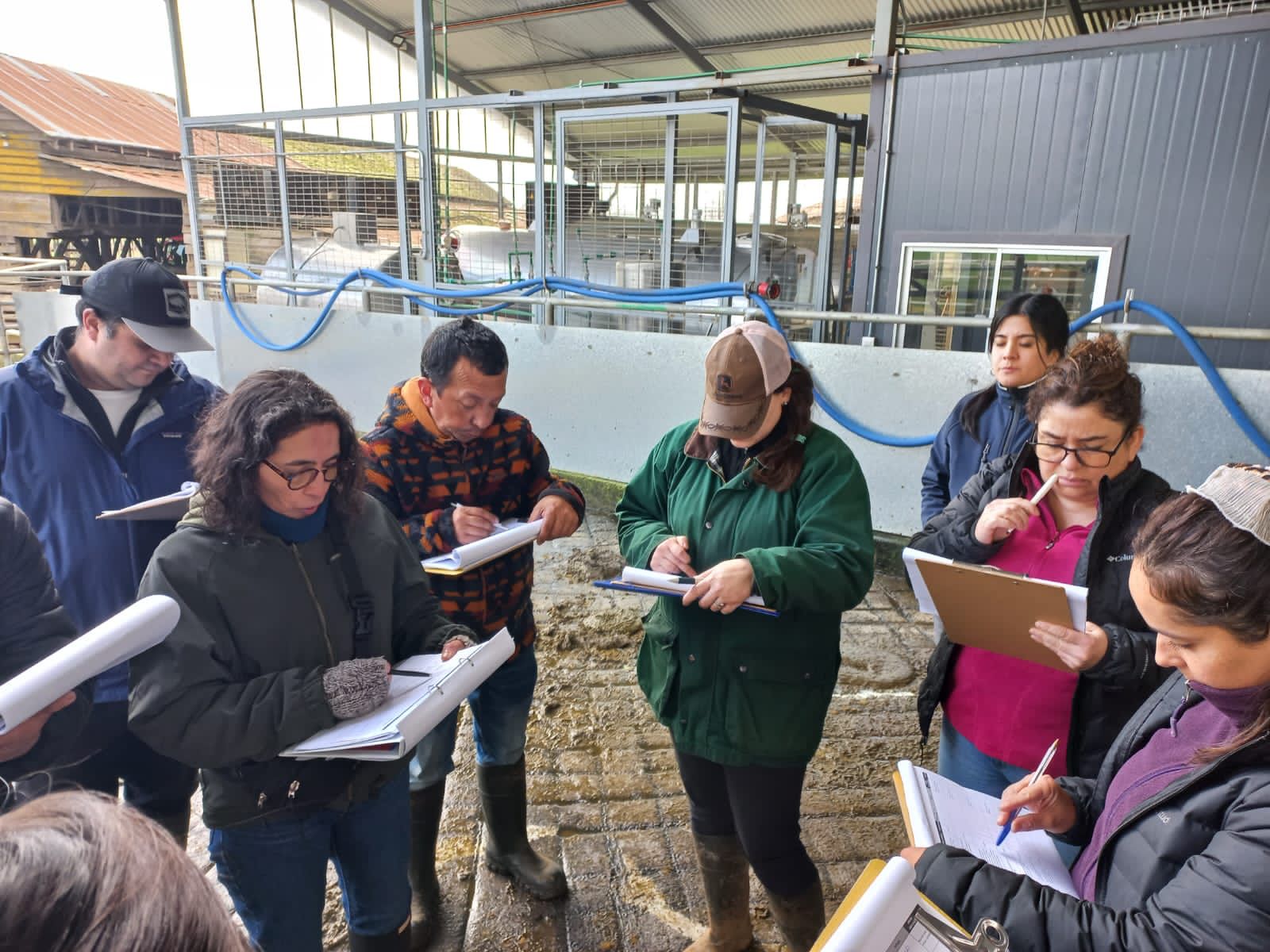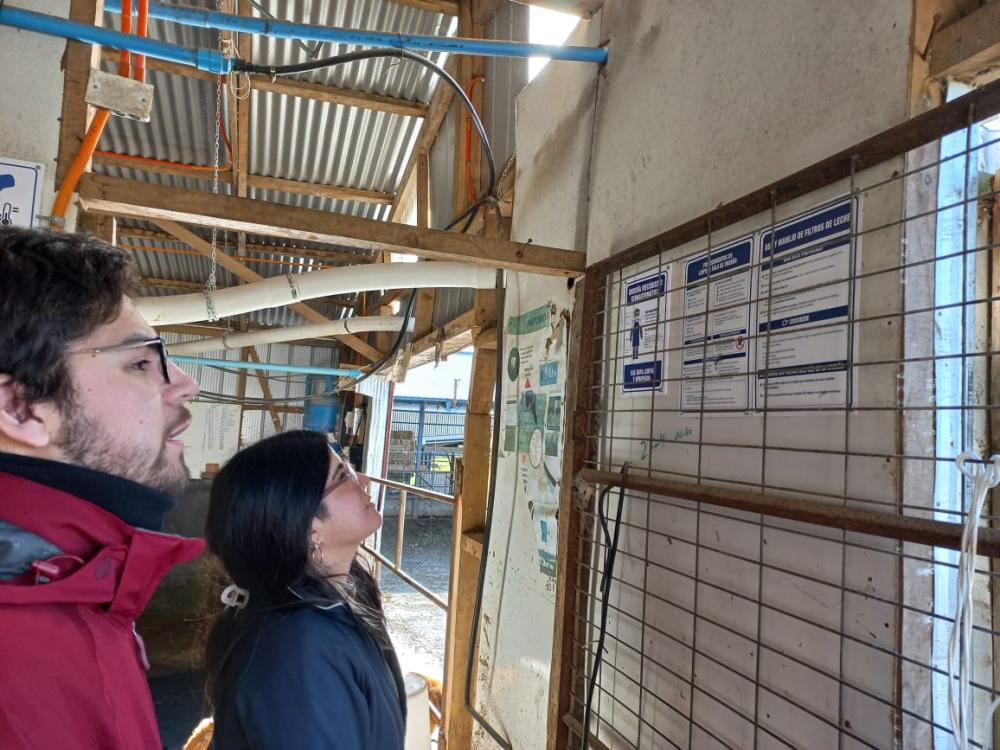The pilot program began in 2022, and today there are more than three hundred dairy farms that have voluntarily completed the self-assessment process regarding the sustainability of their operations.

Santiago, 29 November 2023 (IICA) – With coordinated efforts between the public and private sector, Chile’s agriculture sector is moving towards clean and sustainable production in diverse areas such as poultry, pork, dried plums and the dairy sector.
A clear example of this is the “Chile Origen Consciente” (“Chile Conscious Origin”) program, led by the Office of Agrarian Studies and Policies (ODEPA) and supported by the Agency for Sustainability and Climate Change (ASCC), which have focused on improving sustainability in the agrifood sector.
María José Pizarro, head of ODEPA’s Department of Sustainability and Climate Change, said that this process of participatory construction of sector standards involved unions such as Chilecarne, Asprocer and the Dairy Consortium from the beginning.
“Today, the tools to generate standards are available for all sectors that wish to join”, she assured.
The Chile Conscious Origin Program, in addition to contributing to the goals of the 2030 Agenda, increases global recognition of Chilean food products and companies that voluntarily take on the challenges of producing sustainably”, Pizarro added.
Sustainability Standard for Dairy Farms in Chile
The “Sustainability Standard for Dairy Farms” is a project spearheaded by the Dairy Consortium, a corporation that seeks to foster the sustainable and dynamic development of the Chilean dairy sector, which brings together nearly 90% of producers nationwide and addresses 156 actions under three dimensions: social, economic and environmental.
In that regard, ten aspects of the milk production process are reviewed, namely waste management, animal welfare, water management, biodiversity, soil management, quality and safety, energy management and greenhouse gas emissions, work and social protection, economic management and the relationship with communities.
The pilot program began in 2022, and today there are more than three hundred dairy farms that have voluntarily completed the self-assessment process regarding the sustainability of their operations. Over one hundred of them have already been audited and officially certified, showing that the progress made in environmental issues, animal welfare and other labor aspects are a key part of the operations of dairy producers in Chile.
Natalie Jones, Sustainability Coordinator of the Dairy Consortium, explained that for the development of the standard they received the technical support and knowledge of the Inter-American Institute for Cooperation on Agriculture (IICA).

“This is a tool that certifies and recognizes the actions regularly carried out by national dairy producers, which reassures the community and consumers that what is being done in the field is indeed sustainable”, he explained.
Hernán Chiriboga, IICA Representative in Chile, assured that “the development of the first Sustainability Standard for Dairy Farms has made it possible to develop a management tool for the sector based on the study and identification of good practices and actions that have been or will be implemented”.
IICA has collaborated in the development of resources such as guides, documentation, spreadsheets, records and training sessions so that producers can implement sustainable actions on their dairy farms. The Institute also offered training for auditors of the standard, for INDAP extension agents and for those in charge of implementing the Standard in Peasant Family Farming. It also implemented sustainability standards in other sectors including dried plums, a product of which Chile is the main exporter worldwide.
More information about the Standard can be found at the website https://www.certificacionpredial.cl/ .
IICA also works to promote the development of sustainability standards in other countries in the Americas together with the U.S. Dairy Export Council (USDEC) and Dairy Management Incorporated ( DMI), signing cooperation agreements to strengthen the promotion and harmonization of science-based standards related to food, agriculture in the hemisphere, and participation in international forums for the establishment of standards, and in other major global meetings such as the upcoming COP28 that will start in a few days in Dubai.
Lloyd Day, Deputy Director General of IICA, indicated that this partnership “helps communicate the truth and scientific evidence about the importance of animal agriculture, the development of economies and of farmers’ livelihoods to feed both children and adults, but also for the ability of animals and the industry to contribute to immediate adaptation to climate change”.
Day also participated in the World Dairy Summit organized by the International Dairy Federation (IDF) in Chicago, speaking on an international panel that reflected on global efforts to boost dairy demand.
Within the framework of this international event that brought together more than 1,240 leaders of the dairy sector from 55 countries, IICA signed a memorandum of understanding with the IDF for the development of a joint work program on issues of sustainability and consumer promotion.
For Caroline Emond, Director General of the IDF, “the signing of an agreement with IICA has been an important step forward to further collaborate with a hemispheric organization that promotes sustainable agriculture and dairy production not only in the Americas but also at the global level”.

Emond also referred to Chile’s prominent role in sustainable dairy production, and referred to the world summit to be held in Santiago in 2025. “The IDF WDS 2025 will be an unparalleled opportunity for the Pan-American dairy sector to participate in knowledge exchange and innovation, and to network with world leaders and experts in dairy. It will also constitute an opportunity for the international dairy community to better understand Chilean dairy and its potential”.
More information:
Institutional Communication Division.
comunicacion.institucional@iica.int











